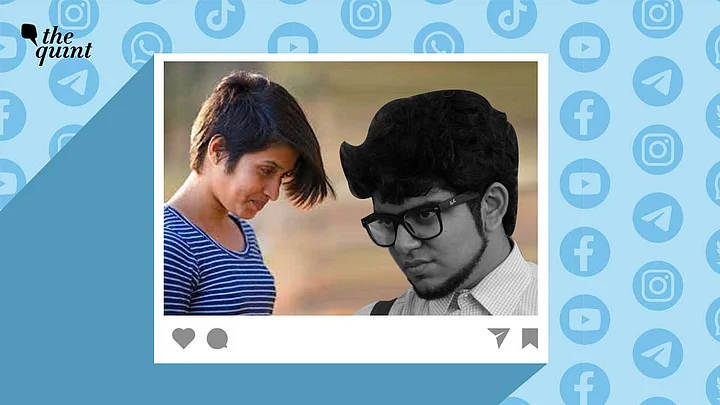We take pride in our exhaustive gender coverage. Your insights and ideas help us dig deeper and tell stories that really matter. Become a Q-Insider and shape the news with us.
(Trigger warning: Descriptions of violence, offensive content. Reader discretion advised.)
The shocking murder of 27-year-old Shraddha Walkar, which came to light in November 2022, highlights the urgent need for conversations about intimate partner violence, isolation of women in interfaith and inter-caste relationships, and the safety of women on dating apps.
However, much of the potential for such conversations is lost, thanks to a wide variety of 'jokes' and memes on the case that flooded Twitter, Reddit, Facebook, and Instagram.
From 'fridge' memes to Islamophobic 'jokes', the internet has managed to dehumanise and trivialise the ghastly murder, driving the focus away from what has actually happened – the death of a woman allegedly at the hands of her partner.
Dehumanising 'Fridge' Memes
Aaftab Poonawala allegedly strangled Shraddha to death and chopped her body up into pieces. Reports suggesting that he bought a new refrigerator to store the body parts for days before he disposed them of have inspired a new brand of memes on social media, namely the 'fridge' memes.
Some of these memes have men standing next to a fridge, making 'jokes' about how they only store vegetables in it, and not 'meat'. The posts on a Facebook group called 'Aftab Poonawalla Fridge Posting' take these 'jokes' to another level of misogyny, with references to necrophilia, rape, and cannibalism.
"What these memes tend to do is flatten out a serious issue," Usha Raman, a professor at the University of Hyderabad, tells The Quint. "They allow for continuous variations of a particular theme, and each variation attempts to be more outrageous than the previous one. As a result, it gets greater circulation and attention."
Prof Raman, who specialises in digital culture, adds:
"Nobody is really thinking about the moral, ethical, or psychological consequences of a message, they're only thinking about the audience – or the play it's going to get."
Given the way social media platforms are structured and given how easy it is for offensive and hateful content to get circulated, she says that the meme culture is like "a game for attention."
The 'Love Jihad' Rhetoric
Most of these memes are shared under the hashtags, "LoveJihad" and "MeraAbdulAisaNahiHai," as Shraddha and Poonawala were in an interfaith relationship.
A Tanishq ad, which received heavy backlash from Hindu right-wing groups for featuring an interfaith couple in 2020, was turned into one such meme, in which a 'Muslim mother-in-law' tells her 'Hindu daughter-in-law' not to worry, as their "fridge is only used to store vegetables."
Another meme featuring the same ad shows the daughter-in-law asking the mother-in-law why they needed a 'spacious' fridge as dowry.
In the current socio-political context, "you only need the slightest excuse" to promote Islamophobia, says Prof Raman.
"If there's the slightest negative news about an individual from a minority community – be it any minority community – it becomes an opportunity for the majority to associate it with the community, rather than the individual," she notes, adding that this phenomenon is being amplified with the help of meme culture.
These highly offensive memes emerge at a time when most interfaith relationships are branded as 'love jihad' by right-wing groups using unsupported figures and claims – as was the case with the trailer of 'The Kerala Story'. You can read more about that here.
The 'She Deserved It' Comments
Another common thread that runs through these memes is victim blaming. From Shraddha's appearance and her strained relationship with her family to her choice of being in a live-in relationship with Poonawala, some of these supposed jokes even go on to say that she 'deserved' to be murdered.
Dr Aqsa Shaikh, a transgender doctor and professor, says that it is "extremely disappointing" to see young people on social media being "driven by this conversation of how live-in or interfaith relationships are bad or how not listening to your parents can be bad, especially for women."
Instead of looking at the crime as intimate partner violence, the conversations on social media are centred around morality, says Prof Raman.
"People are talking about how the couple posed as husband and wife to get a place, how they were in a live-in relationship, and how Shraddha 'left' her family for Poonawala. But they aren't seeing that the real issue is about how young people are not able to exercise their choice and find places to stay or get support in interfaith relationships."Prof Usha Raman
Why This Trend Is Problematic
Shraddha's case has multiple dimensions, but unfortunately, the focus is largely on live-in and interfaith relationships, says Dr Aqsa, adding that this was an opportunity to further the discourse on intimate partner violence and the lack of support women experience when they report abuse.
"When people speak about women's safety, they think about safety in public spaces. The fact that this crime went undetected for nearly six months shows how poor surveillance systems, policing in general, and social attitudes have contributed to this issue."Dr Aqsa Shaikh
She adds that Islamophobic and dehumanising conversations on social media will ultimately become fodder for policymakers to create laws that will "further stigmatise" and even criminalise interfaith and live-in relationships. "There will be undue and disproportionate violence and discrimination against minorities," Dr Shaikh says.
Prof Raman says that due to meme culture, what people would remember at the end of the day is that the accused was Muslim or that the couple were live-in partners. "The meme culture is such that we tend to take out the most shocking, outrageous parts of a story... and that becomes the entire story."
